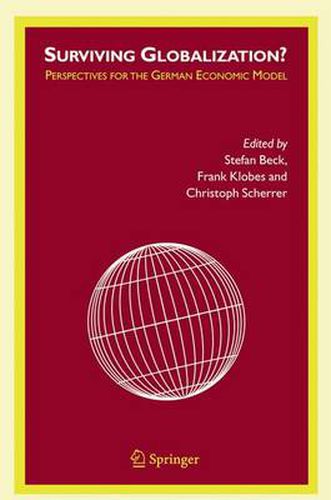Readings Newsletter
Become a Readings Member to make your shopping experience even easier.
Sign in or sign up for free!
You’re not far away from qualifying for FREE standard shipping within Australia
You’ve qualified for FREE standard shipping within Australia
The cart is loading…






This title is printed to order. This book may have been self-published. If so, we cannot guarantee the quality of the content. In the main most books will have gone through the editing process however some may not. We therefore suggest that you be aware of this before ordering this book. If in doubt check either the author or publisher’s details as we are unable to accept any returns unless they are faulty. Please contact us if you have any questions.
society, and state (Streeck, 1999; Simonis, 1998). Interspersed between these most commonly named elements are the following: First, the high political integrating force of the German Model after WWII was based on the adoption and transformation of corporatist political structures from National Socialist Germany. Liberal capitalism was (re)introduced under political competition between Christian Democrats and Social Democrats, who eventually found common ground in the politically mediated compromise between capital and labor: This compromise was negotiated and institutionalized at a time when the communist wing of the workers movement and the authoritarian voices of German capital - for various reasons - were excluded from political participation (Streeck, 1999, p. 15; translation: SB). The partnership between firms and unions manifested itself in manifold institutional structures. Apart from the social partners’ autonomy in matters of wage policy, worker codetermination at plant level and in operations is regarded as one of the special achievements of the German Model and has contributed substantially to social peace. The political coordination forms of concerted action, round tables, as well as modernization and crisis cartels gave birth to a highly complex political decision-making structure which, based on a federalist setup, has rightly been called negotiation state (Esser, 1998, p. 123). Second, the material foundation of this Social Democratic class compromise (Buci-Glucksmann & Therborn, 1981) consisted in the Federal Republic’s - in the words of Goeste Esping-Andersen - conservative-liberal form of welfare state.
$9.00 standard shipping within Australia
FREE standard shipping within Australia for orders over $100.00
Express & International shipping calculated at checkout
This title is printed to order. This book may have been self-published. If so, we cannot guarantee the quality of the content. In the main most books will have gone through the editing process however some may not. We therefore suggest that you be aware of this before ordering this book. If in doubt check either the author or publisher’s details as we are unable to accept any returns unless they are faulty. Please contact us if you have any questions.
society, and state (Streeck, 1999; Simonis, 1998). Interspersed between these most commonly named elements are the following: First, the high political integrating force of the German Model after WWII was based on the adoption and transformation of corporatist political structures from National Socialist Germany. Liberal capitalism was (re)introduced under political competition between Christian Democrats and Social Democrats, who eventually found common ground in the politically mediated compromise between capital and labor: This compromise was negotiated and institutionalized at a time when the communist wing of the workers movement and the authoritarian voices of German capital - for various reasons - were excluded from political participation (Streeck, 1999, p. 15; translation: SB). The partnership between firms and unions manifested itself in manifold institutional structures. Apart from the social partners’ autonomy in matters of wage policy, worker codetermination at plant level and in operations is regarded as one of the special achievements of the German Model and has contributed substantially to social peace. The political coordination forms of concerted action, round tables, as well as modernization and crisis cartels gave birth to a highly complex political decision-making structure which, based on a federalist setup, has rightly been called negotiation state (Esser, 1998, p. 123). Second, the material foundation of this Social Democratic class compromise (Buci-Glucksmann & Therborn, 1981) consisted in the Federal Republic’s - in the words of Goeste Esping-Andersen - conservative-liberal form of welfare state.